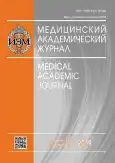GLUCOSE CAN EPIGENETICALLY ALTER THE GENE EXPRESSION OF NEUROTROPHIC FACTORS IN THE MURINE BRAIN CELLS
- Authors: Oomura Y1, Hossain M.S.1
-
Affiliations:
- Department of Neuroinflammation and Brain Fatigue Science, Graduate School of Medical Sciences, Kyushu University
- Issue: Vol 19, No 1S (2019)
- Pages: 14-15
- Section: Articles
- Published: 15.12.2019
- URL: https://journals.eco-vector.com/MAJ/article/view/19297
- ID: 19297
Cite item
Abstract
Glucose is believed to improve the memory in both human and mice, but the detailed insights were mostly elusive. In this study, we focused on two major neurotrophic factors, brain-derived neurotrophic factor (BDNF) and fibroblast growth factor 1 (FGF1), which are believed to be associated with the memory enhancement and assessed their expressional regulation among the murine neuronal and glial cells. Our findings showed that the glucose administration increased phosphorylated Akt, phosphorylated CREB, exon 1- and exon 4-specific BDNF transcripts, and FGF1 transcripts that are associated with the epigenetic changes expected to open the chromatin and a reduction in histone deacetylase 2 (HDAC2) in neurons and astrocytes of the murine hippocampus. The glucose administration enhanced the long-term potentiation and the number of dendritic spines in the CA1 and CA3 subfields of hippocampus. The intrahippocampal injection of short hairpin RNA against TrkB canceled the glucose-mediated memory enhancement. Like the glucose, we also report that the HDAC inhibitor can enhance the memory through the BDNF-TrkB pathway but it targeted different brain cell populations to enhance the BDNF and FGF1 transcripts. In addition, the soluble FGF1 treatments significantly increased the BDNF expression in astrocytes and neurons, suggesting that the glucose-mediated induction of the neurotrophic factors could contribute to the memory. Our study provides the valuable insights, explaining the distinctive neuronal and glial cell regulation of the neurotrophic factors by glucose and HDAC inhibitor, which could likely explain how our brain cells can control the release of neurotrophic factors.
Full Text
About the authors
Y Oomura
Department of Neuroinflammation and Brain Fatigue Science, Graduate School of Medical Sciences, Kyushu University
Md Sh Hossain
Department of Neuroinflammation and Brain Fatigue Science, Graduate School of Medical Sciences, Kyushu University
References
Supplementary files







